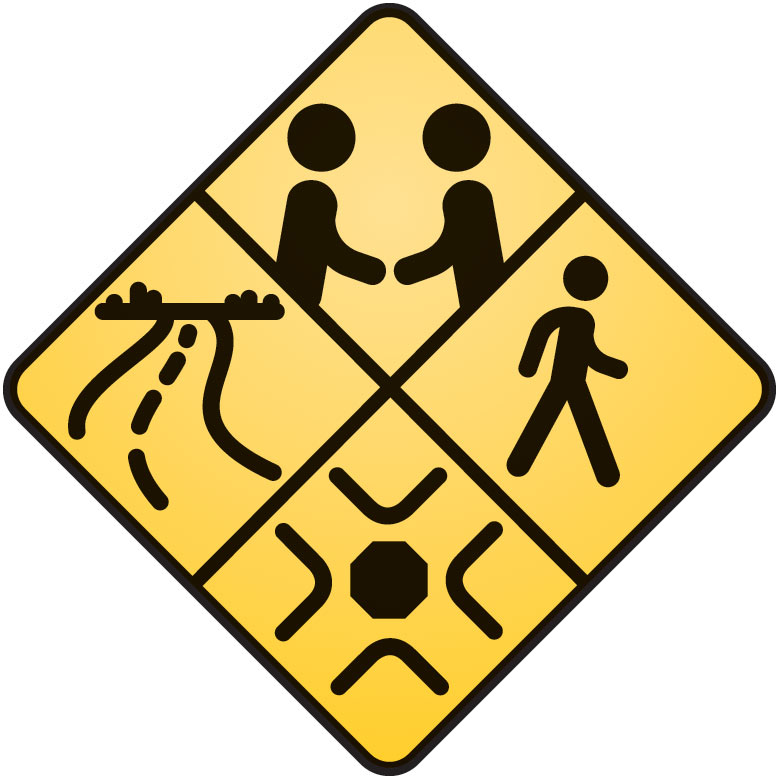U.S. Department of Transportation
Federal Highway Administration
1200 New Jersey Avenue, SE
Washington, DC 20590
202-366-4000

The West Virginia Division of Highways (WV DOH) hosted a Peer Exchange to share information and experiences for streamlining Highway Safety Improvement Program (HSIP) project delivery. The event was held September 22 to 23, 2014 in Charleston, West Virginia. This report summarizes the results of the event, which was supported by the Federal Highway Administration (FHWA) Office of Safety's Roadway Safety Professional Capacity Building Program and the FHWA West Virginia Division Office.
The FHWA Office of Safety and the FHWA West Virginia Division Office worked with WV DOH to convene representatives from four peer States, including Kentucky, North Carolina, South Carolina, and Tennessee. Representatives from West Virginia included members of the safety team in WV DOH's Traffic Engineering Division. The purpose of the peer exchange was to share noteworthy practices for streamlining HSIP project delivery and identify opportunities for West Virginia to advance HSIP project delivery from planning through design and construction. The full agenda is available in Appendix A and the list of participants is available in Appendix B.
The WV HSIP peer exchange had the following objectives:
During the first day of the exchange, the peer states and WV DOH presented an overview of their respective HSIPs. The States compared and discussed administration, program development, project management, and technical accomplishments. Peer states responded to questions from WV DOH about their HSIPs and identified key takeaways.
States described specific details about project delivery during peer presentations on the second day of the event. The following common themes emerged regarding practices that successfully streamline HSIP project delivery:
After the peer states presented their strategies for streamlining HSIP project delivery, the group prepared recommendations for WV DOH on how to apply some of these practices in West Virginia.
A WV DOH representative provided an overview of the agency's HSIP program. All projects using federal safety funding (on or off the State highway system) must meet one of the following criteria:
Before a project is included or funded as a highway safety project, the Mobility and Safety Section of Traffic Engineering must review, approve, and sign off on project programming documents or agreements.
West Virginia received a more than 40 percent increase in HSIP funding from FY 2012 to FY 2013
Other key points regarding West Virginia's HSIP program include the following:
Recent increases in safety funding in West Virginia have created a challenge for the limited staff in the DOH to effectively deliver the HSIP. WV DOH received Section 154/164 Sanction Funding this year, and these funds must be obligated within one year; the minimum time frame for WV DOH to develop a project is eighteen months. In FY 2012 under SAFETEA-LU, West Virginia received 7.5 million in Section 154/164 funds and the following fiscal year under MAP-21, funding increased to $9.3 million. Similarly, HSIP funding increased from $15 million in FY 2012 under SAFETEA-LU to $25.5 million in FY 2013 under MAP-21, an increase of over 40 percent in a single year.
West Virginia has taken steps to strengthen its HSIP program and these accomplishments are important to recognize as they demonstrate WV DOH's commitment to safety. WV DOH is in the process of finalizing its Safety Management System (SMS). Once the new system is in place it will provide an array of network screening and linear referencing tools. The peer team agreed that it will be important for West Virginia to identify how the State wants to use data to prioritize projects. There is a large effort in an HSIP spent analyzing data and creating lists of prioritized projects. Staffing is required for this stage but collaboration and partnerships are also required to move the projects through implementation.
The peer team discussed all components of West Virginia's HSIP, including planning, implementation and evaluation. The State should consider the following as it updates its program.
The peer team generated a number of specific recommendations to assist WV DOH in achieving its HSIP goals. The following recommendations were presented to WV DOH and FHWA West Virginia Division Office leadership at the conclusion of the meeting.
A successful safety program requires a clear definition of the program elements and how they will be managed. WV DOH should develop a spending and investment plan that supports program goals. The program should strike the right balance between hot spot and systemic improvements. The program should also have an established methodology for developing projects, including, but not limited to, timelines for various project phases and goals for designing and letting projects. It is also essential to conduct evaluations for use in future programming decisions and to gain support for the program.
Create staffing plan and determine optimal mix of in-house staff, on-call contractors, and university partnerships to effectively implement the program
Peer States suggested that WV DOH consider creating a detailed staffing plan for safety projects. Current staffing levels versus ideal staffing levels should be established, and then strategies for closing the gap should be evaluated by program management. Peer states have had success with a combination of in-house staff, on-call contractors, and university partnerships. The right mix of these different resource types can provide flexibility for WV DOH staff priorities.
Once a programmatic framework and methodology for project selection are established, peers suggested specific approaches to achieve streamlined program delivery. Peer State participants suggested grouping projects together in the STIP, and exploring the use of alternate project implementation pipelines, such as on-call contracts, for routine safety projects. Regardless of the approach, it is necessary to establish a backlog of projects. Some states suggested over-programming or planning two years out, but others took a less rigid approach.
The West Virginia FHWA Division Office will work with WV DOH to implement these recommendations and improve HSIP project delivery efforts.
| 8:00 | Welcome Tom Smith, FHWA Division Office, and Cindy Cramer, West Virginia Division of Highways Overview & Introductions (FHWA) |
| 8:30 | Current State of HSIP in WV Donna Hardy, West Virginia Division of Highways |
| 9:30 | Break |
| 9:45 | Roundtable Visiting States (Kentucky, North Carolina, South Carolina, and Tennessee) will provide an overview of their HSIP, covering the same items addressed by the host state. |
| 12:00 | Lunch |
| 1:00 | Key Takeaways Participating states identify and discuss noteworthy practices from the HSIP overview presentations. |
| 1:30 | Discussion of WV Challenges and Desired Future State of WV HSIP Donna Hardy, West Virginia Division of Highways |
| 2:30 | Break |
| 2:45 | Peer Presentations: Streamlining HSIP Project Delivery
Kentucky: Moving Ahead for Progress - HSIP in Kentucky - Tracy Lovell, Kentucky DOT North Carolina: NC DOT HSIP 2014 - Program Delivery - Kevin Lacy, North Carolina DOT South Carolina: SC DOT Project Development Process - D. Brett Harrelson, South Carolina DOT Tennessee: Project Delivery Innovative Methods - Brian Hurst, Tennessee DOT |
| 4:30 | Wrap-up Summarize highlights of Day 1 and provide a brief overview of Day 2 activities. |
| 5:00 | Adjourn |
| 8:00 | Welcome Back/Recap |
| 8:15 | Streamlining HSIP Project Delivery |
| 9:15 | Key Takeaways Participating States identify and discuss noteworthy practices from the streamlining HSIP project delivery presentations. |
| 9:45 | Break |
| 10:00 | Develop Recommendations/Prepare Report |
| 12:00 | Lunch (on your own) |
| 1:00 | Close-out Meeting Visiting states present recommendations to FHWA and DOH leadership, with presentations from the following people: Greg Bailey, WV DOH State Highway Engineer Todd Rumbaugh, WV DOH Deputy State Highway Engineer - Construction & Development Emiliano Lopez, FHWA Assistance Division Administrator |
| 3:00 | Adjourn |
| FHWA/Volpe | |
|---|---|
| Laura Black USDOT Volpe Center Cambridge, MA Business Phone Number: 617-494-2274 Business Email: laura.black@dot.gov |
Keith Sinclair FHWA Resource Center Baltimore, MD Business Phone Number: 410-962-3742 Business Email: keith.sinclair@dot.gov |
| Karen Scurry FHWA Office of Safety West Trenton, NJ Business Phone Number: 609-637-4207 Business Email: karen.scurry@dot.gov |
Susan Smichenko USDOT Volpe Center Cambridge, MA Business Phone Number: 617-494-3438 Business Email: susan.smichenko@dot.gov |
| Kentucky | |
| Jarrod Stanley Transportation Engineer Specialist Kentucky Transportation Cabinet Frankfort, KY Business Phone Number: 502-782-5539 Business Email: jarrod.stanley@ky.gov |
Michael Vaughn HSIP Safety Engineer Kentucky Transportation Cabinet Frankfort, KY Business Phone Number: 502-782-4923 Business Email: mike.vaughn@ky.gov |
| Tracy Lovell Transportation Engineer Kentucky Transportation Cabinet Frankfort, KY Business Phone Number: 502-564-3020 Business Email: tracy.lovell@ky.gov |
|
| North Carolina | |
| Kevin Lacy State Traffic Engineer NCDOT Garner, NC Business Phone Number: 919-773-2800 Business Email: jklacy@ncdot.gov |
Brian Mayhew Traffic Safety Engineer NCDOT Garner, NC Business Phone Number: 919-773-2886 Business Email: bmayhew@ncdot.gov |
| South Carolina | |
| Eric Hall Safety Project Development Engineer SCDOT Columbia, SC Business Phone Number: 803-737-2083 Business Email: hallse@scdot.org |
Dan Hinton Safety and Traffic Engineer FHWA SC Division Office Columbia, SC Business Phone Number: 803-253-3887 Business Email: daniel.hinton@dot.gov |
| Brett Harrelson State Safety Engineer SCDOT Columbia, SC Business Phone Number: 803-737-3378 Business Email: harrelsodb@scdot.org |
|
| Tennessee | |
| Timothy Armstrong Transportation Project Specialist Tennessee DOT Nashville, TN Business Phone Number: 615-253-5327 Business Email: shaun.armstrong@tn.gov |
Brian Hurst Transportation Safety Manager Tennessee DOT Nashville, TN Business Phone Number: 615-253-2433 Business Email: brian.hurst@tn.gov |
| West Virginia | |
| Cindy Cramer Director, Traffic Engineering Division West Virginia Division of Highways Charleston, WV Business Phone Number: 304-558-9442 Business Email: cindy.l.cramer@wv.gov |
Emiliano Lopez Assistant Division Administrator FHWA WV Division Office Charleston, WV Business Phone Number: 304-347-5929 Business Email: emiliano.lopez@dot.gov |
| Tom Hammonds HSIP Coordinator West Virginia Division of Highways Charleston, WV Business Phone Number: 304-558-9595 Business Email: tom.h.hammonds@wv.gov |
Jason Workman Director of Program Development FHWA WV Division Office Charleston, WV Business Phone Number: 304-347-5271 Business Email: jason.workman@dot.gov |
| Donna Hardy West Virginia Division of Highways Charleston, WV Business Phone Number: 304-558-9576 Business Email: donna.j.hardy@wv.gov |
|
